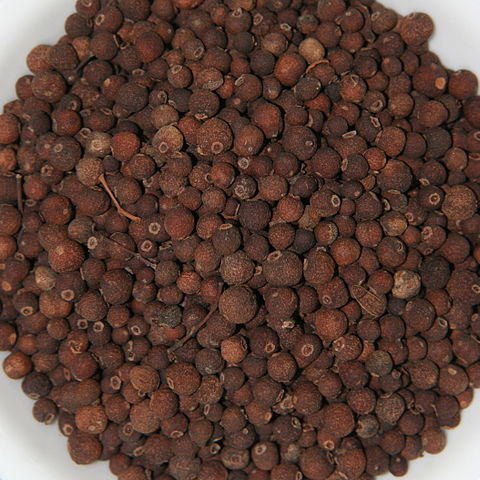Common Names and Other Names:
- Allspice
- Jamaica Pepper
- Pimenta
- Myrtle Pepper
- Newspice
- Clove Pepper
Where Does It Occur:
Allspice (Pimenta dioica) is native to the Caribbean, particularly Jamaica, and parts of Central America:
- Jamaica: The largest producer and exporter of allspice.
- Mexico
- Guatemala
- Honduras
- Cuba
The tree thrives in tropical climates, preferring rich, well-drained soils and full sun exposure. It is typically found in:
- Rainforests
- Coastal regions
- Lowland forests
Basic Ingredients (Constituents):
Allspice contains several bioactive compounds that contribute to its flavor, aroma, and medicinal properties:
- Volatile Oils:
- Eugenol: Major component responsible for the clove-like aroma and analgesic properties.
- Methyl Eugenol
- 1,8-Cineole
- Phellandrene
- Phenolic Compounds:
- Gallic Acid
- Quercetin
- Kaempferol
- Tannins:
- Contribute to astringent properties.
- Vitamins:
- Vitamin A
- Vitamin C
- B Vitamins (B1, B2, B6)
- Minerals:
- Manganese
- Iron
- Copper
- Potassium
- Magnesium
Most Commonly Used For Treatment Of:
- Digestive Issues:
- Carminative: Relieves gas, bloating, and indigestion.
- Stomachic: Stimulates appetite and aids digestion.
- Antidiarrheal: Helps alleviate diarrhea.
- Pain Relief:
- Analgesic Properties: Used to reduce muscle aches, joint pain, and menstrual cramps.
- Respiratory Conditions:
- Expectorant: Assists in relieving coughs and congestion.
- Cold and Flu Symptoms: May reduce symptoms like sore throat and nasal congestion.
- Anti-inflammatory Effects:
- Reduces inflammation, potentially benefiting conditions like arthritis.
- Antimicrobial Activity:
- Inhibits the growth of certain bacteria and fungi.
- Antioxidant Properties:
- Neutralizes free radicals, supporting overall health.
Side Effects:
Allspice is generally safe when used in culinary amounts, but potential side effects may include:
- Allergic Reactions:
- Skin Irritation: Particularly when using the essential oil; may cause redness, itching, or rash.
- Respiratory Symptoms: Rare cases of asthma or respiratory distress.
- Gastrointestinal Issues:
- Stomach Irritation: In large amounts, may cause nausea or vomiting.
- Interaction with Medications:
- Blood Thinners: Eugenol may enhance the effects of anticoagulant medications, increasing bleeding risk.
- Anesthetics: Eugenol may interact with anesthetic agents.
- Skin Sensitivity:
- Photosensitivity: Increased sensitivity to sunlight when applied topically.
Available Forms in the Market:
- Dried Berries (Whole or Ground):
- Used as a spice in cooking and baking.
- Essential Oil:
- Extracted from the berries or leaves for aromatherapy and topical applications.
- Capsules/Tablets:
- Contain powdered allspice for supplementation (less common).
- Liquid Extracts and Tinctures:
- Alcohol-based extracts for internal use.
- Topical Preparations:
- Creams or ointments containing allspice for pain relief (often combined with other ingredients).
Research and Results:
- Antimicrobial Activity:
- Study: “Antibacterial properties of allspice essential oil.”
- Findings: Demonstrated inhibitory effects against bacteria like Escherichia coli and Staphylococcus aureus.
- Reference: Journal of Ethnopharmacology
- Anti-inflammatory Effects:
- Study: “Eugenol’s anti-inflammatory activity in models of acute inflammation.”
- Findings: Showed significant reduction in inflammation markers.
- Reference: Pharmacology
- Antioxidant Properties:
- Study: “Antioxidant activities of allspice extracts.”
- Findings: Exhibited strong antioxidant activity due to phenolic content.
- Reference: Food Chemistry
- Analgesic Effects:
- Study: “Pain-relieving properties of Pimenta dioica essential oil.”
- Findings: Indicated potential analgesic effects in animal models.
- Reference: Phytotherapy Research
Note: While these studies show promising results, most are preliminary or conducted in vitro or on animals. More clinical research on humans is needed to confirm efficacy.
Precautions:
- Pregnancy and Breastfeeding:
- Use with Caution: Insufficient reliable information is available; consult a healthcare provider before use.
- Bleeding Disorders:
- Increased Bleeding Risk: Eugenol may affect blood clotting; avoid use if you have a bleeding disorder or are taking anticoagulant medications.
- Allergies:
- Sensitivity to Eugenol: Individuals allergic to cloves, cinnamon, or other plants containing eugenol should exercise caution.
- Medication Interactions:
- Anticoagulants (e.g., warfarin): May enhance bleeding risk.
- Anesthetics: Potential interactions; inform your healthcare provider before surgery.
- Skin Application:
- Dilution Required: Essential oil should be diluted with a carrier oil before topical use to prevent skin irritation.
- Children:
- Use with Caution: Not recommended for young children without professional guidance.
Conclusion:
Allspice (Pimenta dioica) is a versatile spice valued for its rich aroma and potential health benefits. It has been traditionally used to aid digestion, relieve pain, reduce inflammation, and support respiratory health. While generally safe when used in culinary amounts, caution is advised when using allspice essential oil or supplements.
Recommendations:
- Consult a Healthcare Professional:
- Before using allspice for medicinal purposes, especially if you have underlying health conditions or are taking medications.
- Moderation is Key:
- Use allspice in recommended amounts to minimize potential risks.
- Quality Assurance:
- Purchase products from reputable sources to ensure purity and safety.
- Patch Test:
- When using essential oil topically, perform a patch test to check for skin sensitivity.
Disclaimer:
This information is intended for educational purposes and should not replace professional medical advice. Always consult a qualified healthcare provider for personalized guidance before using allspice for medicinal purposes.
« Back to Glossary Index